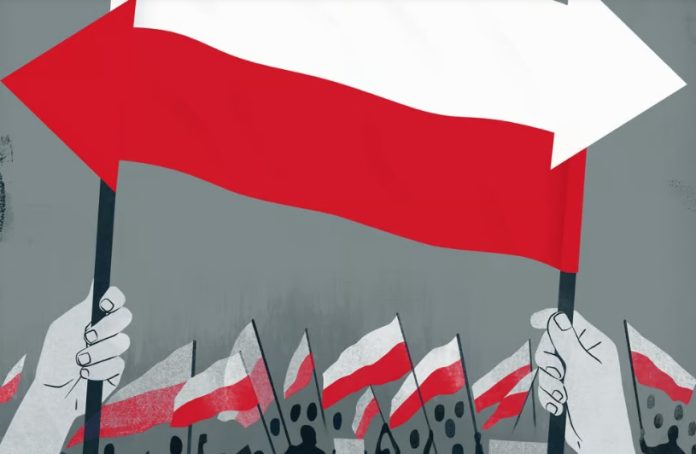According to young people and civic activists, the upcoming elections in Poland are a decisive or turning point. The country’s democratic institutions, women’s rights and the future of the EU are now at stake.
They are called the Freedom Games.
This annual event in the Polish city of Łódź brings together artists, filmmakers, historians, academics and writers.
This year, the venue is full of young people as well as those who are older. Outside the conference halls there are brightly coloured stands with posters and leaflets. They have come to fight for democracy. For change. For a new beginning. Kasia Witek, 47, a member of the Committee for the Defence of Democracy (KOD), a Polish civic organization, said:
This election is so important for us. I want Poland to remain a democracy. I want it to stay in the EU. I want Poland to be a country that I want to live in. As a woman, I don’t feel safe anymore.
Vitek and others do not want the ruling conservative, nationalist Law and Justice (PiS) party to win the upcoming 15 October elections.
In power since 2015, PiS has systematically destroyed democratic institutions and civil rights established after 1990. In case of a new victory, PiS leader Jaroslaw Kaczynski has vowed to complete the so-called “reform” of the judiciary. As a result, it will completely undermine Polish democracy. Women at the Freedom Games believe that a PiS victory would make their rights even more vulnerable. Agnieszka Czastuowska, 42, said:
PiS has trampled on women’s rights.I want to feel secure in my country. I just don’t want to be repeatedly judged for the things I do or believe in. Many young women, if they are pregnant and want an abortion, often seem powerless. There are cases where they die in hospital. Doctors are in a very difficult situation because they too are afraid. We must have change.
Civil society continues to try to put Poland back on the path to democracy, despite PiS’s increased control over state TV channels and tighter control over education, the army, the judiciary, the police, security services and the civil service. Adam August, a political science student, claimed:
We go to the towns and villages to explain why democracy is so important, why we need independent judges, why we need the rule of law.
He and his colleagues have visited more than 100 cities across the country over the past several months. They wanted to explain to young people what democracy means. Adam added:
We meet in parks or in village squares. It’s about making civil society matter.
There were many representatives of civil society at the Freedom Games. The main idea of these activists was the urgent need to defend Polish democracy. If this is not done, Poland will never be able to turn into a modern state based on the rule of law.
The consequences for the EU would be significant. A large country like Poland – the fifth largest in the union – could significantly change the direction of other countries. The victory of SMER, a Eurosceptic and pro-Russian party, in the recent Slovak elections showed the fragility of centrist politics and the growing rise of nationalist and populist movements. Mikolaj Walczak, a 22-year-old law student and member of the Łódź branch of the European Law Students’ Association, explained:
Poland has not completely lost its freedom. We will lose it if we don’t work for it. I’m still hopeful for change. I wouldn’t be living here if I didn’t believe in that.
Piotr said:
I want to live in a real liberal democracy that respects our dignity and human rights. PiS has polarized our country.
Erik responded:
I want our country to be for us, not against us. The opposition which we support is demonized. As for the EU, we want to remain in it. But PiS is always criticizing Europe. It’s always portraying Poland as a victim.
Now that the EU is withholding billions of euros from Warsaw’s post-Kovid recovery funds until PiS restores judicial independence, this sense of victimhood is reflected in the election campaign. PiS argues that the EU wants to impose its values on Poland and undermine the country’s sovereignty. To the question of how PiS has affected his life in practical terms, Oskar replied:
What I don’t like is the nationalism and the role of the Catholic church.
Alexandra said:
It’s the way our values and human rights are being questioned. Sometimes I think people don’t know what is happening to their civil rights. Or else maybe Poles overall don’t believe in their institutions. Our parents certainly didn’t believe in them during the communist times. Yet today, in our democracy the independence of the judges, for instance, is threatened so much. What does that do to trust in the institutions?
When voting day comes, all these people hope that the opposition, grouped around the Civic Platform, will win. Pawel said:
This is about our country and about the EU. I don’t want Poland to leave the EU. There is no alternative to the EU.And if PiS is reelected? Like we said, we are all thinking of leaving…
